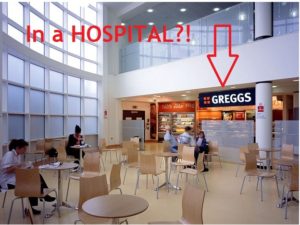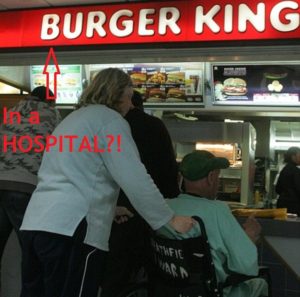
A recent NHS report entitled ‘Every NHS hospital in England to cut sugary drinks sales‘ 1 has agreed to cut their sales of sugary drinks on their premises. The NHS England says that it’s all part of their action to tackle the rising levels of obesity in the nation. But is it too little, too late?
Blog Contents
Total ban?
Not at all. The 227 NHS Trusts are simply pledging to reduce sales of sugar-sweetened drinks to 10% or less of their total drinks sales.
There’s no indication of exactly when they are pledging to do this. We hear lots of pledges – usually from politicians who then either forget they made the pledges or adjust the pledge to mean something different from what was first stated.
Hopeful signs
23 NHS Trusts and two retailers have decided to stop selling sugary drinks altogether.
There is no clear indication of what ‘sugary drinks’ means here.
The NHS report states that sugar-sweetened drinks sold on NHS premises has reduced for seven months in a row falling to just 7.4% in participating Trusts in June 2018.
NHS comment
Simon Stevens, Chief Executive of NHS England said:
“Every hospital in the country is now answering this important call to action and the NHS is rightly leading the way in battling the growing obesity epidemic across the country.”
I think it’s a bit of an overstatement to claim that the NHS is leading the way. Have you seen the sort of food they give patients? And even allowing the likes of Costa Coffee and Greggs inside their premises is far from the standards set by anyone eating a WFPB diet, since there’s hardly anything at all you could eat or drink that Costa or Greggs sell.
If, however, they mean that they are leading the way when compared with other national health authorities, then of course they’re going to lead – they are the only one in England!
Retailers inside NHS premises
14 retailers which operate inside NHS premises (including WH Smith, Boots, Marks & Spencer and Greggs), have signed up to this modest NHS ‘health drive’.
NHS staff – credible health workers?
It’s pretty shocking to hear NHS’s own figures that, of their 1.3 million plus staff in England alone, nearly 700,000 of these are estimated to be overweight or obese. This is not a surprise when you visit hospitals. Their staff look more unwell than many of the patients – especially when they’re lounging against the outside walls with a fag in one hand and a can of Coke in the other.
Final thoughts
It could be viewed as tokenism if they are simply targeting ‘added sugar’ drinks. This is because many soft drinks contain artificial sweeteners, and these have been shown 2 to be as bad as, or even potentially worse than, sucrose for human health.
I applaud any efforts to address the catastrophe that our current national dietary and health policies are causing on the health of our people. But this will be too little too late for some many people who have already developed the unhealthy dietary habits, which are really tough to break, and who have already inflicted possibly irredeemable damage to their bodies and their prospects of long and healthy lives.
And what about the real culprits – high-fat, processed animal foods? I guess it’s just too much for the NHS to try and tackle Big Food, especially when most of the NHS committees will consist of people who actually eat this junk – even when they are at work…

When you visit an NHS hospital you may have seen the corridors-full of obese and over-weight NHS staff, and it may have occurred to you that, for the majority of these unfortunate carers, their patients are simply keeping the beds warm for them.
References
- NHS England: Every NHS hospital in England to cut sugary drinks sales [↩]
- Bitter Effects of Artificial Sweeteners [↩]